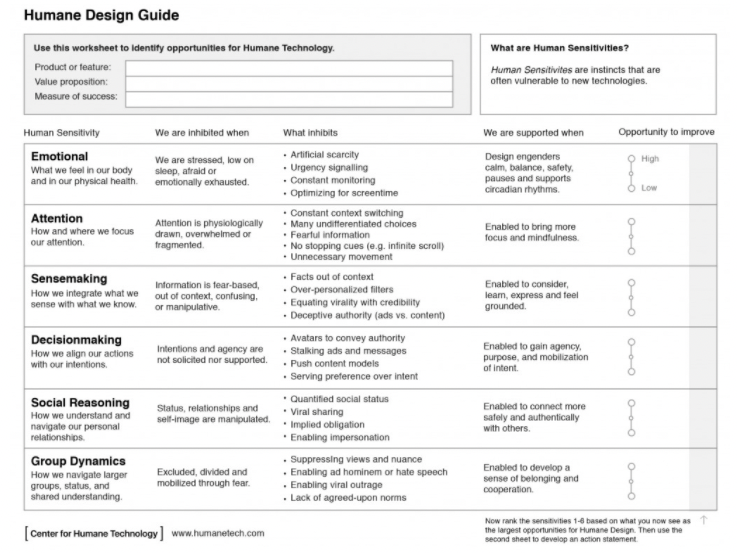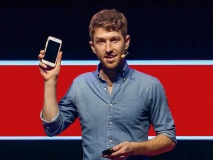Difference between revisions of "Tristan Harris"
(last section) |
(sizing) |
||
| Line 35: | Line 35: | ||
== Speaker Events and Calls to Action == | == Speaker Events and Calls to Action == | ||
| − | + | === Congress Hearings === | |
In addition to the Center of Humane technology, Harris often travels across the country to spread his message, and has spoken at Two Congress hearings. The first, on June 25th 2019, was titled “Optimizing for Engagement: Understanding the Use of Persuasive Technology on Internet Platforms”, and testified how technology giants are taking advantage of people’s attention<ref> congress1 </ref>. The most recent, on January 8th of 2020, was titled "Americans at Risk: Manipulation and Deception in the Digital Age”<ref> link here </ref>, highlighting the urgency for legislation to stop Big Tech’s leverage on the public<ref> congress2 </ref>. | In addition to the Center of Humane technology, Harris often travels across the country to spread his message, and has spoken at Two Congress hearings. The first, on June 25th 2019, was titled “Optimizing for Engagement: Understanding the Use of Persuasive Technology on Internet Platforms”, and testified how technology giants are taking advantage of people’s attention<ref> congress1 </ref>. The most recent, on January 8th of 2020, was titled "Americans at Risk: Manipulation and Deception in the Digital Age”<ref> link here </ref>, highlighting the urgency for legislation to stop Big Tech’s leverage on the public<ref> congress2 </ref>. | ||
| − | + | === Ted Talks === | |
===== How Better Tech Could Protect Us From Distraction ===== | ===== How Better Tech Could Protect Us From Distraction ===== | ||
In the beginning of the Time Well Spent movement in 2014, Harris gave this Ted Talk in Brussels. He suggests that technologies need to return the power of choice back to the user. This could be seen in the form of “pausing” our technologies, which are commonly seen today with setting time limits on apps. He emphasizes that designers need to reengineer the platforms to create a net positive contribution to humanity while users need to demand this change. | In the beginning of the Time Well Spent movement in 2014, Harris gave this Ted Talk in Brussels. He suggests that technologies need to return the power of choice back to the user. This could be seen in the form of “pausing” our technologies, which are commonly seen today with setting time limits on apps. He emphasizes that designers need to reengineer the platforms to create a net positive contribution to humanity while users need to demand this change. | ||
Revision as of 21:55, 18 March 2021
| Birthname | Tristan Harris |
| Date of Birth | 1984 |
| Birth Place | San Francisco, CA |
| Nationality | American |
| Occupation | Founder of the Center of Humane Technology |
| Biography | Information Ethicist |
Tristan Harris is a former software engineer, computer scientist, and psychologist [1]. He is most widely known as a prominent information ethicist. He was also recently featured in Netflix's, “The Social Dilemma”, a documentary which highlights the human impact on social networking, where he talks about his experiences working at Google[2].
Contents
Early life and Education
Born in 1984[3], Harris grew up in the midst of the Digital Age; a time where his classmates would grow up to invent Facebook [4]. As a child, Tristan Harris was fascinated by magic, which contributed to his growing interest in technology and its influence on human behavior[5]. Harris attended Stanford University and graduated in 2006 with a degree in Computer Science[6]. During his time at Stanford, Harris interned at Apple and helped create the “Spotlight for Help” feature, designed to allow the user to find apps, documents, and files on their Mac[7]. Fifteen years later, this is now commonly seen as a magnifying glass in the top right corner of the current Macbooks[8].
In addition to his computer science classes, Harris took supplemental classes in behavioral economics, social psychology, behavior change, and habit formation. He really began to focus on human behavior change while working at Professor BJ Fogg’s Stanford Persuasive Technology Lab[9]. His supplemental studies encouraged him to pursue a master's program in the “psychology of behavior change” [10], but he did not finish that degree.
Instead, while in school, Harris founded Apture[11], which was a service that allowed blogs and news sites to add additional facts or insights to their content. The company was so successful that it was eventually acquired by Google, where Harris joined the team as a product manager[1].
Work and Career
At Google, Harris started and headed Google’s “Reminder Assist” project, which is now spread across Google products. It is an autocompletion engine to help users "remember things that they want to do". [10] While he was working as a product manager, Harris attended Burning Man, which he stated "awakened him to question his beliefs"[12]. After he returned, he created a 144-page slide deck [3] titled “A Call to Minimize Distraction & Respect Users’ Attention”[13] that discusses Big Tech abusing the attention economy. In his presentation, Harris demonstrates the severity of this issue in a simple, yet powerful quote: “Never before in history have the decisions of a handful designers working at 3 companies (Google, Apple, and Facebook) had so much impact on how millions of people around the world spend their attention.” [3]. Harris sparked the conversation of the monopolization of Big Tech. Although Harris only shared the slideshow to 10 people internally in the company, it somehow spread to 5,000 Google employees and even reached the CEO at the time, Larry Page. Thousands of employees applauded him for his statements and agreed. Despite all of this, Harris states that nothing changed. Product roadmaps and requirements still had to be met.
While he did not get the reaction he had hoped for, Harris transitioned from Product Manager to Design Ethicist and Product Philosopher within Google. Here, Harris made a stronger impact on the company and the way information ethics were handled. Harris' primary job was to study the way screen applications affect users in terms of overall mental health and behavior[1]. Using the findings from this study, Harris worked on developing a framework for how technology could ethically steer the thoughts and actions of millions of people[14]. He also spent time trying to make Big Tech companies realize the social implications of their products. The Atlantic referred to Harris as "the closest thing Silicon Valley has to a conscience"[15]. At Google, however, Harris felt limited and unable to enact change, causing him to ultimately leave the company in 2013[16].
Center of Humane Technology
After leaving Google, Harris forged Time Well Spent, a movement focused on promoting the user of technology with intention and care to dispute tech companies' goal to hold the user's attention for as long as possible[17]. Harris claims that technology is responsible for the following: reducing attention spans, distraction, information overload, polarization, social isolation, etc. [18]. The movement gained so much attention that Harris went on to co-found the Center of Humane Technology with Ava Raskin [19] and Randima Fernando[20]. The Center of Humane Technology is a non-profit dedicated to shifting the digital infrastructure toward "humane technology that supports our well-being, democracy, and shared information environment"[21]. Their work includes educating the public, supporting technologists through training workshops, and advocating for policy change to advance legislation toward Big Tech[22].
He also created the Humane Design Guide [18] which educates designers how to identify opportunities to create humane technology.
 [18]
[18]
The Center of Humane Technology does not plan to slow down any time soon. In 2021, they are launching a course called the Fundamentals of Humane Technology, developed to "explore the personal, societal, and practical challenges of being a humane technologist"[23].
Speaker Events and Calls to Action
Congress Hearings
In addition to the Center of Humane technology, Harris often travels across the country to spread his message, and has spoken at Two Congress hearings. The first, on June 25th 2019, was titled “Optimizing for Engagement: Understanding the Use of Persuasive Technology on Internet Platforms”, and testified how technology giants are taking advantage of people’s attention[24]. The most recent, on January 8th of 2020, was titled "Americans at Risk: Manipulation and Deception in the Digital Age”[25], highlighting the urgency for legislation to stop Big Tech’s leverage on the public[26].
Ted Talks
How Better Tech Could Protect Us From Distraction
In the beginning of the Time Well Spent movement in 2014, Harris gave this Ted Talk in Brussels. He suggests that technologies need to return the power of choice back to the user. This could be seen in the form of “pausing” our technologies, which are commonly seen today with setting time limits on apps. He emphasizes that designers need to reengineer the platforms to create a net positive contribution to humanity while users need to demand this change.
How a Handful of Tech Companies Control Billions of Minds Every Day
In 2017 talk, Harris lists 3 radical steps that he believes society must take to counteract how these companies are hijacking our minds. [27]
- Transform our self-awareness: many people believe that they are not susceptible to persuasion. [28]
- Reform the way that these systems are inherently designed: for instance, one way to do this would be to remove comments on Facebook with a ‘Let’s Meet’ button. Harris talks about this as a way to make our time unfragmented. Instead of constant distraction, schedule a productive amount of time to discuss a topic with someone. Over time, this would shift society back towards face-to-face interactions as opposed to hiding behind the screen of these new technologies and platforms. This would greatly reduce polarization of people's views so that we could actually understand who we are talking to before we make a comment. [28]
- Transform business and increase accountability: social media companies monetize through corrupt advertising models. Business models should not use advertising which targets demographics of people and polarizes sets of people. Instead, we should transition towards subscriptions and micropayments. Similar to how society is moving away from coal, tech giants need to make this transition for a more socially sustainable future. [28]
References
- ↑ 1.0 1.1 1.2 Bosker, Bianca How Burning Man Inspired The Social Dilemma's Tristan Harris To Speak Out Retrieved 12 March 2021.
- ↑ hi
- ↑ 3.0 3.1 3.2 Bosker, Bianca The Binge Breaker Retrieved 12 March 2021.
- ↑ hi2
- ↑ Harris Biography Retrieved 12 March 2021.
- ↑ Lachenal, Jessica Future Society Retrieved 12 March 2021.
- ↑ hi3
- ↑ hi4
- ↑ hi5
- ↑ 10.0 10.1 Harris, Tristan Tristan Harris LinkedIn Retrieved 12 March 2021.
- ↑ hi6
- ↑ hey
- ↑ Minimized Distractions Slide Deck Retrieved 12 March 2021.
- ↑ Ted Mini Biography - Tristan Harris) Retrieved 12 March 2021.
- ↑ hello
- ↑ mags
- ↑ maggss
- ↑ 18.0 18.1 18.2 Voices of VR Retrieved 12 March 2021.
- ↑ me
- ↑ yo
- ↑ me2
- ↑ me3
- ↑ yo yo
- ↑ congress1
- ↑ link here
- ↑ congress2
- ↑ How a handful of tech companies control billions of minds everyday Retrieved 12 March 2021.
- ↑ Cite error: Invalid
<ref>tag; no text was provided for refs namedtwelve

